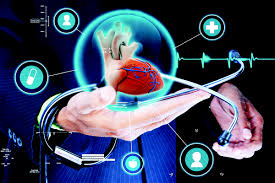info@gladsme.in
+91.8891968718
Revolutionizing Medicine: The Promise of Smart Healthcare
Revolutionizing Medicine: The Promise of Smart Healthcare

The healthcare industry is on the brink of a technological revolution. Smart healthcare, characterized by the integration of cutting-edge technology and medical practices, is transforming the way we approach health and wellness. From wearable devices that monitor vital signs to AI-driven diagnostic tools, smart healthcare is set to enhance patient care, streamline operations, and improve outcomes. In this blog, we'll explore the various facets of smart healthcare and how it promises to revolutionize medicine.
The Rise of Smart Healthcare
Smart healthcare encompasses a wide range of technologies and innovations. These include:
Wearable Health Devices: Wearables like fitness trackers and smartwatches monitor heart rate, physical activity, sleep patterns, and more. They provide real-time data that can help individuals manage their health and alert medical professionals to potential issues before they become critical.
Telemedicine: The COVID-19 pandemic accelerated the adoption of telemedicine. Virtual consultations allow patients to receive medical advice from the comfort of their homes, reducing the need for in-person visits and easing the burden on healthcare facilities.
Artificial Intelligence (AI) in Diagnostics: AI algorithms are being developed to assist in diagnosing diseases. These algorithms can analyze medical images, predict patient outcomes, and even suggest treatment plans. AI is particularly effective in identifying patterns that might be missed by human eyes.
Electronic Health Records (EHRs): EHRs streamline the management of patient information. They provide a centralized database that can be accessed by authorized medical professionals, ensuring that patient history is always up-to-date and easily accessible.
IoT in Healthcare: The Internet of Things (IoT) connects medical devices and systems, enabling seamless data exchange. Smart hospital beds, connected inhalers, and remote monitoring devices are just a few examples of how IoT is enhancing patient care.
Benefits of Smart Healthcare
Improved Patient Outcomes: By leveraging real-time data and advanced analytics, smart healthcare can lead to more accurate diagnoses, personalized treatment plans, and better patient monitoring. This results in improved health outcomes and reduced hospital readmissions.
Cost Efficiency: Smart healthcare technologies can help reduce costs by streamlining operations, reducing the need for unnecessary tests, and minimizing hospital stays. Telemedicine, for example, cuts down on travel expenses and time off work for patients.
Enhanced Patient Engagement: Wearable devices and mobile health apps encourage patients to take an active role in their health. By providing users with easy access to their health data, these technologies promote healthier lifestyles and proactive health management.
Accessibility: Telemedicine and remote monitoring make healthcare more accessible, especially for those living in remote areas or with limited mobility. Patients can receive quality care without the need for extensive travel.
Challenges and Considerations
While smart healthcare holds great promise, there are several challenges to address:
Data Security and Privacy: The integration of technology in healthcare raises concerns about data security and patient privacy. Robust measures must be in place to protect sensitive information from cyber threats.
Interoperability: For smart healthcare systems to be effective, they must be able to communicate with each other seamlessly. Standardizing data formats and ensuring compatibility between different systems is crucial.
Cost of Implementation: The initial investment in smart healthcare technologies can be high. Healthcare providers must weigh the long-term benefits against the upfront costs and ensure they have the necessary infrastructure and training in place.
Regulatory Compliance: Healthcare technologies must comply with stringent regulations and standards to ensure safety and efficacy. Navigating these regulatory requirements can be complex and time-consuming.
Smart healthcare represents a significant leap forward in the way we approach medical care. By harnessing the power of technology, we can improve patient outcomes, enhance efficiency, and make healthcare more accessible to all. As we continue to innovate and address the challenges, the future of smart healthcare looks incredibly promising.
Stay tuned as we delve deeper into specific smart healthcare technologies and their impact on the medical field in our upcoming posts.
Related Blogs

The Importance of Data Structures in Software Development
Read More...
Exploring Machine Learning Algorithms: A Beginner's Guide
Read More...
The Evolution of Programming Languages: From Assembly to Rust
Read More...
Understanding Big O Notation: A Guide for Developers
Read More...Subscribe for our Newsletter
Subscribe to elevate your software game! Stay updated on the latest trends, coding insights, and exclusive promotions with our newsletter.
